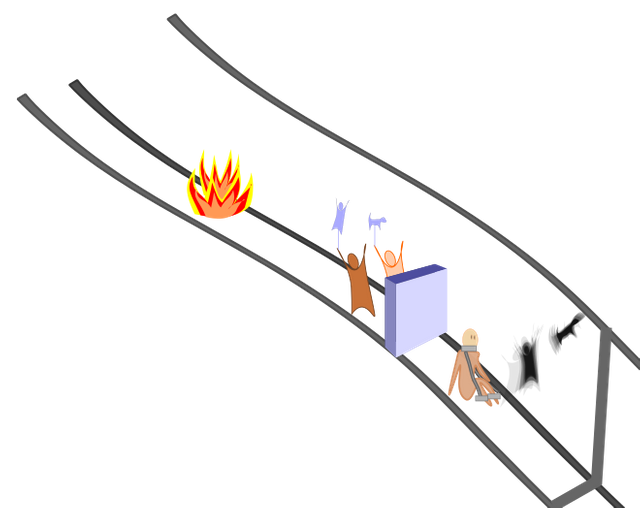#1 The Philosophers - "Allegory of the cave" by Platon
In my studies of philosophy I got the task to ask questions about the cave parable, which I would like to share with you here.
The allegory
Socrates describes a subterranean, cave-like dwelling, from which a rough and steep passage leads upwards to the earth's surface. In the cave live people who have spent their whole life there as prisoners. They are tied to their thighs and necks in such a way that they can only look forward to the cave wall and cannot turn their heads. Therefore they can never see the exit behind their backs and know nothing of its existence. Neither can they see themselves or the other prisoners; the only thing they ever see is the wall they are turned towards. Their dwelling is illuminated by a fire that burns behind them far up in the distance. The prisoners see only this light that illuminates the wall, but not its source. They see shadows on the wall. Between the inside of the prison and the fire there is a small wall that is not so high that it shields the light of the fire. Along the wall, people carry various objects back and forth, replicas of human figures and other living creatures made of stone and wood. These objects protrude beyond the wall, but their bearers do not. Some bearers talk to each other, others are silent. Since the moving objects cast shadows on the cave wall to which the prisoners are turned, the cave inhabitants can perceive the moving shapes as shadows. But they do not suspect anything about the bearers. When someone speaks, the echo echoes back from the cave wall as if the shadows were speaking. Therefore the prisoners think that the shadows can speak. They regard the shadows as living beings and interpret everything that happens as their actions. What is happening on the wall is for them the whole reality and is absolutely true. They develop a science of the shadows and try to establish regularities in their appearance and movements and to derive forecasts from them. They give praise and honor to the one who makes the best predictions. Now Socrates asks Glaucon to imagine what would happen if one of the prisoners were to be untied and forced to stand up, turn around, look towards the exit and turn to the objects themselves, whose shadows he has observed so far. This person would be painfully blinded and confused by the light. She would consider the objects that now came into her field of vision to be less real than the shadows she was familiar with. She would therefore feel the need to return to her usual position, because she would be convinced that reality could only be found on the cave wall. She would not believe any contrary teachings of a well-meaning liberator. If the liberated man were now to be dragged out of the cave by force and brought to the surface through the impassable and steep ascent, he would resist this and would be even more confused, for he would be blinded by the brightness of the sunlight and could therefore see nothing at first. Slowly he would have to get used to the sight of the new, whereby he could first recognize shadows, then reflections in the water and finally the people and things themselves. Looking up, he would first want to familiarize himself with the night sky, later with daylight, and finally he would dare to look directly at the sun and perceive its composition. Then he could also understand that it is the sun whose light creates shadows. After these experiences and insights he would have no more need to return to the cave, to deal with the science of shadows there and to be praised for it by the prisoners. Should he nevertheless return to his old place, he would first have to get used to the darkness of the cave again slowly. Therefore he would do badly for some time at the usual inspection of the shadows there. The cave dwellers would conclude from this that he had spoiled his eyes above. They would laugh at him and think that it obviously could not be worthwhile to leave the cave even for an attempt. If someone tried to free them and lead them up, they would kill him if they could.

My question: Do you think that if the freed prisoner is explained how the shadows are cast, he would easily accept it? Would he even have the necessary cognitive skills to understand the existence of the shadows?
If not, then he could sink into a delirium furiosum and thus no longer access his mind in a healthy way.
If he did, what would he do? Play arbitrary tricks on the other prisoners with the shadows, in order to tease them for their "ignorance" or even consciously manipulate them, in order then to introduce himself to you as "prophet" or "ruler of the shadows"?
Write me your ideas. I would be very happy about your opinion and perspective and maybe we "argue" a little ;)

Stay healty
Sincerly
litshit69